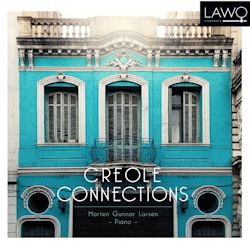Ernesto NAZARETH (1863-1934)
Odeon
Labirinto
Batuque
Carioca
Tenebroso
Nenê
Turbilhão de beijos
Vem cá, branquinha
Louis Morean GOTTSCHALK (1829-1869)
Danza Op.33
O, Ma Charmante, épargnez-moi!
Suis Moi!
Mazurk
Astor PIAZZOLLA (1921-1992)
Retrato de Alfredo Gobbi
La muerte del angel
Hal ISBITZ (b.1931)
Danza No.2
David T ROBERTS (b.1955)
Maria Antonietta Pons
Ignacio CERVANTES (1847-1905)
Te Quiero Tanto!
Ernesto LECUONA (1895-1963)
A la Antigua
La Comparsa
Lionel BELASCO (1881-1967)
Venezuelan Little Tune arr. Morten Gunnar Larsen
Morten Gunnar Larsen (piano)
Recorded September 2013 and May 2014, Oslo [71:38]
Who better to explore Creole connections than stalwart Stride master, Morten Gunnar Larsen? The Norwegian pianist explores the musics of the New World
colonies – those danzons, the beguine, the tango, the ‘danza’ from Puerto Rico and more besides - whilst focusing in particular on the music of the
Brazilian composer and pianist Ernesto Nazareth (1863-1934). No less a figure than Villa-Lobos called him ‘the true incarnation of the Brazilian soul’ – a
fine tribute from a man many consider to embody that quality himself.
The gatefold disc offers a brief introduction to music and musicians but to get more out of this disc you should follow the invitation to read the
e-booklet at www.lawo.no. Only then will you get a greater and more in-depth picture of the repertoire that Larsen is
bringing to wider notice ‘in Norway’ - one of Larsen’s intentions for the album, but also – I’d hope – further afield even than that. It would have been
better had there been real booklet notes, which would made this process easier but rather than turn into one of those rampaging critics who froth at the
mouth about booklet indiscretions, let me just register a certain disappointment and leave it at that.
Larsen plays Nazareth with rhythmic élan and vitality. There’s something infectious about his timing in Odeon whilst a Chopinesque pallor hangs
over Labirinto which itself prefaces the great thematic richness and rolling brio of Batuque. These are all tangos but they are all
richly personalised and full of vivid communicative colour. A different side of the composer is his suavely classical Tenebroso tango and the
poetic Turbilhao de beijose is a waltz that hints once again at the abiding Chopinesque influence on Nazareth’s dance rhythms. Vem ca is
a ‘Peanut Vendor’ affair rolling and driving and played with elegant rubati by Larsen. Nazareth’s influence on succeeding generations of classical
composers should also not be overlooked. Even as he was himself influenced by such as Chopin it’s clear that he influenced questing spirits such as Darius
Milhaud, in a cross-pollinatory fusion.
Other composers are also saluted. Louis Moreau Gottschalk is represented by four pieces. Whilst Danza, Op.33 is a touch overlong for its material
this 1857 opus is beautifully played, with plenty of rich chording, whilst the sadness and the passion of O Ma Chamante is well characterised. The
brace by Piazzolla present him in all his tragic breadth and rich evocations. Ignacio Cervantes was a pupil of Gottschalk in Havana and the sole piece by
him is a charmer based on a popular Cuban song. It’s good to hear something of Ernesto Lecuona including one of the best-known of his Afro-Cubanas, La Comparsa. The work of two contemporaries brings matters up to date. Hal Isbitz, a Californian, dedicated Danza No.2 to Larsen whilst
David T Roberts contributes Maria Antonieta Pons – a vivacious sounding portrait indeed.
This is a most enjoyable album. Of course Nazareth and indeed Lecuona have been well recorded by other eminent pianists. However there is a contextual
question at the heart of this disc, and it offers heady rhythmic flair to banish all Blues.
Jonathan Woolf
